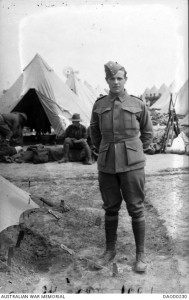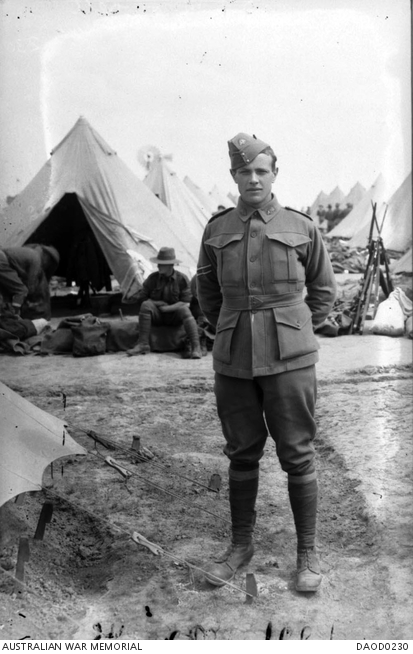
Herbert Maurice Robertshaw at Broadmeadows army camp, Victoria, October 1914.
Image courtesy Australian War Memorial.
Herbert Maurice Robertshaw was born in Orange in 1887, the second son and fifth child of Henry Robertshaw and his wife Jeanie. By the turn of the century the family had relocated to Melbourne, where Herbert attended Moreland Primary School. In 1901 the Education Department awarded Herbert a scholarship to attend Brunswick College, and it was there, in 1906, that he passed his matriculation examination. In 1908 he completed his second year of a Bachelor of Arts degree and was awarded honours in Mental and Moral Philosophy.
The terms of Herbert’s scholarship stipulated that he proceed to the Ministry of the Presbyterian Church of Victoria; by January 1914 he was the Reverend at Northcote Presbyterian Church.
Reverend Robertshaw was one of the first men born in Orange to enlist in WWI, doing so in Melbourne on 17 August 1914, just a week after voluntary recruitment commenced.
Herbert was given the rank of Corporal and assigned to the 6th Infantry Battalion. He embarked from Melbourne in October 1914 and joined the Mediterranean Expeditionary Force in Alexandria in early April 1915.
Corporal Robertshaw was part of the second wave to land at Gallipoli on 25 April 1915. According to a fellow soldier Robertshaw hit the sands at Anzac Cove and advanced about two miles inland before becoming separated from his comrades. He was initially reported as missing in action however the proceedings of a Court of Enquiry held at Erquinghem in France on 24 April 1916 pronounced him to have been killed in action on 25 April 1915.
Two men from Orange lost their lives that fateful day: Robertshaw and Eric Martin Solling. Charles Herbert Cane was killed in action just two days later on 27 April. These three men were the first people from Orange to die in WWI.
Herbert Maurice Robertshaw is commemorated on the Lone Pine Memorial, Gallipoli, Turkey with others who have no known grave.

